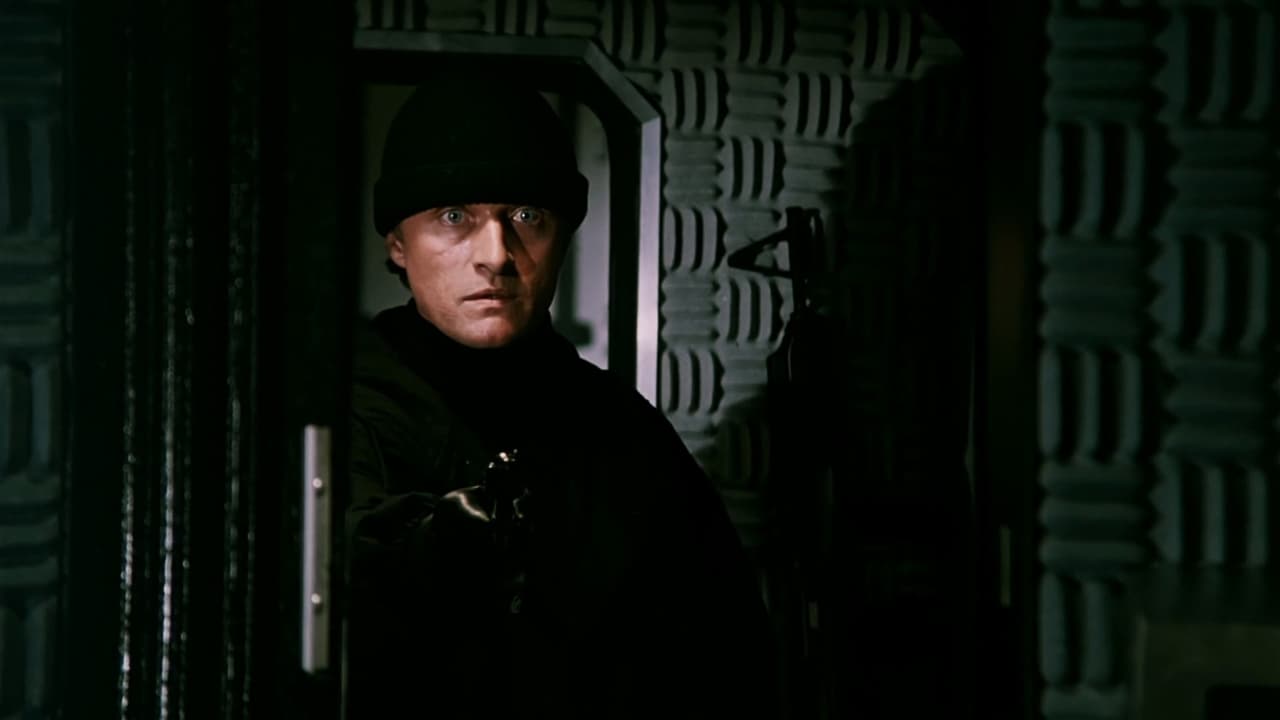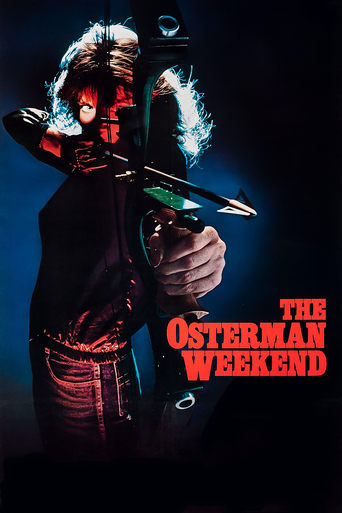

Overrated and overhyped
... View MoreAn absolute waste of money
... View MoreEach character in this movie — down to the smallest one — is an individual rather than a type, prone to spontaneous changes of mood and sometimes amusing outbursts of pettiness or ill humor.
... View MoreBlistering performances.
... View MoreWould someone tell me what the hell is going on ? Peckinpah's films tend to improve with age. They also get better the more often you watch them. For these reasons I'm reluctant to award this film fewer than 8 stars, but I don't think I can manage more than six. Those initial jump-cuts have me guessing.Critics such as Ebert, Kehr and Canby wrote that it "made no sense whatever"; "the structure is a mess"; "incomprehensible" and "hallucinatory". First time through, without prior preparation, I could hardly understand any of it. However, Wikipedia came to the rescue with a painstaking explanation of what was going on, and I now see that there may have been some deeply submerged pattern to the story's narrative. The surface explanation is that this is Fassett's extremely complicated way of getting his own back on his boss, for killing his wife, a seemingly pointless exercise in the first place, the motivation for which was not clear to me at all. The boss, Burt Lancaster, didn't seem to be aware of having committed the murder, and even if he was, he didn't appear to link Fassett, John Hurt, with her in any case. Not according to his subsequent dealings with Hurt, anyhow.I'm already confused. The confusion is not simplified by the multiple closed circuit television set-ups spying all over the place, some of which didn't seem to be off any public radar, and were being publicly broadcast nationwide. Anyway, after murdering some of his friends and their girlfriends, and crowing "then there were two", the perpetrator, Fassett/Hurt, finally gets shot by Rutger Hauer, who rescues his kidnapped wife, his son and his dog, whose death had previously been faked. It is difficult to understand why Fassett aimed to murder Hauer/Tanner's friends, including Tanner himself, and his family. What happened to Lancaster/Danforth, after he was exposed on television ? We should have been told. I'll just have to watch this film again, a number of times. I believe the book is good: there just doesn't seem to be a close or adequate marriage between the visuals and the script. Having now watched it twice, it becomes distinctly better. In fact, it is positively good. Terminally professional. Two more stars.One thing: like many of Peckinpah's films, it is prophetic, in view of recent political events in the USA. It points out how we are increasingly manipulated by the programmes on television, which is truer today than 40 years ago. Switch off, if you can. You can do it, if you try. 40 years ago ! Remarkable.
... View More*SPOILERS*SPOILERS*SPOILERS*SPOILERS*SPOILERS*SPOILERS*SPOILERS*This is the last movie of famous movie director Sam Peckinpah ("The Wild bunch" , "Bonnie and Clyde" ) . Unfortunately , this one belongs to his weaker movies . Too bad , because it had some real potential . The movie is based on Robert Ludlum novel with the same title . From what I've heard the screenplay was heavily rewritten, so in the end the movie isn't exactly too loyal to the book. Nevertheless it's the screenplay which is the biggest problem of the movie. I've seen this movie two times and I wasn't able to find the answers for my questions. I think "The Osterman weekend" has some big plot holes that destroy the movie. If Hurt was only interested in Hauer then why all the trouble ? Wasn't it much easier for him to kidnap his family and blackmail him ? After all he only wanted the interview . The murder of Hurts wife also doesn't makes sense . They really wanted to convince Hurt that her death was natural ? That she died from heart attack ? There was blood bleeding from her nose and they left a huge trace of needle on her nose , for God's sake. The actions of Hurts henchman are also idiotic. Hurt needs Hauer alive , but they doing everything they can to kill him. But the most stupid thing is the ending . The movie BETRAYS THE TWIST TO THE AUDIENCE that Hauer isn't in the studio while the interview is on TV. And how did Hauer find out where Hurt is ? He did used some kind of heat sensor , but how did he knew that he should go to the port (or wherever Hurt was hiding ) ?Peckinpah was sick while he was making "TOW" and it shows . The pacing is rather bad . The movie never seems to catch any kind of rhythm . Also , the slow motion scenes that Peckinpah is known for ( for modern audiences probably less than John Woo) here are looking absolutely awful . Very cheesy , with no dynamic and beauty. Bad montage . The music by Lalo Schifrin is also strangely inadequate. There is some impressive cast here : Rutger Hauer ( "Blade runner") , John Hurt ("1984") , Burt Lancaster ("Birdman of Alcatraz") , Dennis Hopper ("Blue Velvet") and Craig T. Nelson ("Poltergeist") . None of them fails . They all give really solid performances , especially Hauer and Hurt . Hauer doesn't quite fit the role of a TV journalist , but in the end I didn't mind it. There is some violence and nudity here . It's also interesting that both Ludlum and Peckinpah are showing us some kind of reality show before the idea of reality show even appeared. This is also the most intriguing part of the movie , when Peckinpah was able to create some true psychological tension between the characters.Still , this one was a disappointment . Not a total failure , but definitely below the expectations. I give it 4/10.
... View MoreThe Osterman Weekend, a respectable, entertaining if not auspicious swan song of a great subversive director's career (then again neither was his death very auspicious), is from a Robert Ludlum novel. Being that it's from the 'Bourne' series writer, going in without much knowledge of how he exactly writes one can be sure of certain traits that the film adaptations will have. One of which, chiefly, are some twists, and then double-twists, and maybe one more twist for the road. It's fitting though since the story is pit in the arena of the CIA, KGB, shady dealing, backstabbing, revenge, and friendships and family on a slippery slope. For Peckinpah, it's more of a "job" than an actual artistic endeavor like an 'Alfredo Garcia.' And, in fact, his final cut was taken away and re-edited slightly by the producers.Whether or not it's a credit to Bloody Sam's talent and intuition that the film looks as good as it does with the producer's meddling is hard to figure. Certainly things need to be paid attention to closely for confusion not to run rampant, but for this kind of thriller it doesn't feel too compromised. This isn't to say this is any unique material for Peckinpah, with the story of a TV show host (Rutger Hauer) who is put under pressure by an operative (John Hurt) to turn in his old college friends (i.e. Craig T. Nelson, Dennis Hopper) who come every year to his house for a weekend of frivolity, and then everything going to pot as the tables are turned. In fact, to be blunt, most any director with a capability for the spy-thriller genre could handle the material with good enough gloves to make it watchable.But for Peckinpah, luckily, there are some points where he can put his trademark touches on the material (i.e. car chase, final attack scene by the pool-side), and he's also got a pretty good ensemble to work with (aside from the others mentioned, Burt Lancaster appears in a few scenes and is terrific as usual in all of them). It's not very heavy material, and there's even some dated 80's music- odd since it's dependable Lalo Schifrin at the chords- put in a couple of scenes to badly staged sex scenes. But overall it's still good work from the director, usually on his toes with the material despite the reports of his alcohol abuse on the set. We're sucked into this character John's dilemma, and see the subtleness of Hurt's performance as an indicator that something isn't quite right throughout until the surprise comes along.It's slick film-making, with some touches of taut suspense thrown in, and a fairly tasteless bit involving a dog's severed head! Just don't go in expecting full blown magnificence (or the rock-em-sock-em style of the Bourne movies).
... View MoreThis is only the second of Peckinpah's works I watch... the first being Convoy(yup, I sure do seem to pick 'em, don't I?), and I'm definitely intrigued. The first thing that struck me as interesting in this was the use of the medium of television, and the act of watching... there is a lot of playback. There are some very memorable scenes herein. The plot is well-written. I was confused at times, which I can't quite say at this point for sure who that has more to do with, Ludlum or already mentioned director(or even one of the script-writers). The pacing is quite good. There is considerable tension at points(Sam certainly knows how to create that), and the use of slow-motion, and to relatively negligible extent, his strong violence(don't get me wrong, though, this is pretty disturbing viewing) that I've been told of, I did see. There's not an awful lot of action, but it's well-done when there is, engaging and exciting. There is some language, and a nominal amount of nudity and sexuality. The acting is great(not sure I've cared for T. Nelson in anything else), Foster displays a wider range of emotion here than in They Live(and Hurt I'm not sure is actually capable of not giving solid performances). Effects are nicely done. The editing is marvelous, and there are some remarkably effective bits. This film is worth watching. The commentary track is worth a listen, featuring some of those who studied the director. I recommend this to fans of Sam Peckinpah, Robert Ludlum and/or spy movies. 7/10
... View More